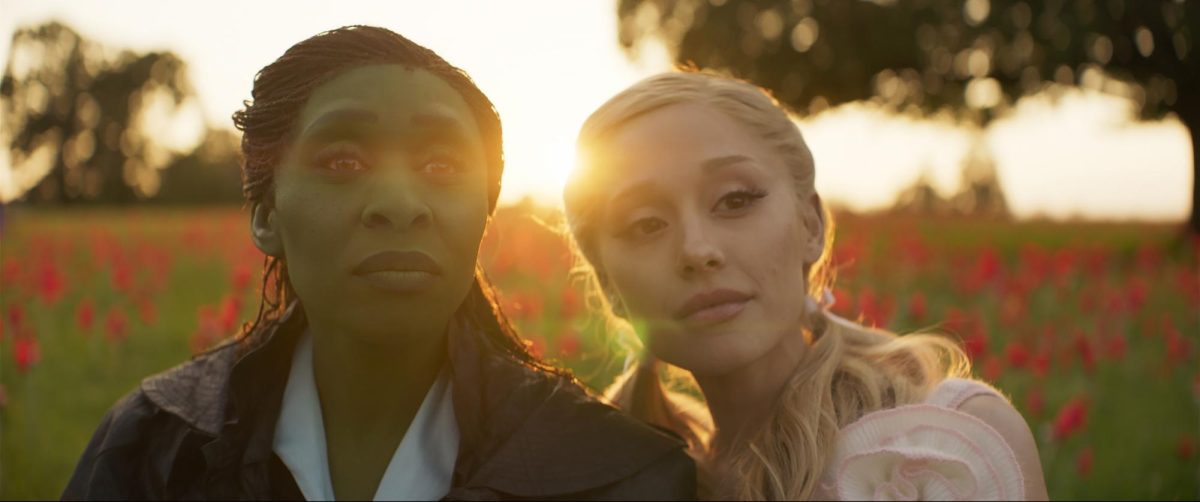Ariana Grande released her seventh studio album “eternal sunshine” on March 8. It is available on all streaming platforms, including Apple Music and Spotify. The album contains just one feature, from Grande’s grandma, whom she lovingly calls nonna. Though the singer has released higher quality work, “eternal sunshine” is beautifully passionate, intimate and has allowed the singer to break her silence over a recent controversy.
The media’s perception of Grande has turned upside down since the release of her last album, “Positions.” She divorced her husband of two years, Dalton Gomez, and quickly moved on to a new relationship with her “Wicked” co-star, Ethan Slater. Fans were left confused about the relationship’s timeline, which caused Grande to face accusations of infidelity.
Grande stayed quiet about the allegations until the release of her single “yes, and?” which is the lead single on “eternal sunshine.” The song is speculated to be about her apathy towards the controversy surrounding her romance with Slater. Grande uses the rest of “eternal sunshine” to further portray the unapologetic attitude of “yes, and?” asserting that her story is more than just rumors on the internet.
The album has a laid-back, muted energy. It is as if Grande is telling the world that she is at peace with her decisions. However, that does not match tonally with the sensitive subject of infidelity in marriage–the controversy she references throughout the album. The lack of remorse on Grande’s part is extremely off-putting and makes the listening experience almost uncomfortable.
The title of the album is inspired by the 2004 movie “Eternal Sunshine of the Spotless Mind.” The movie follows a couple that breaks up and decides to erase each other from their memories through a medical procedure.
In the music video for the song “we can’t be friends (wait for your love),” Grande recreates the scene from “Eternal Sunshine of the Spotless Mind” in which the male lead erases all recollection of his previous relationship from his brain. As Grande undergoes the procedure she revisits her most cherished memories with Evan Peters, who plays her love interest. As a result, the leftover reminders of their love affair get replaced with new items, like a dog bowl instead of a dazzling necklace.
Grande has stated that “eternal sunshine” is a concept album–an album containing tracks that have a larger purpose or meaning collectively than they do individually. Through loosely connected lyrics in each song, the singer tells a story and provides listeners a clear idea of the big picture: forgetting a breakup and starting a new relationship.
“I wanted to share with you that this is kind of a concept album because it’s all different, heightened pieces of the same story of the same experience,” Grande said in a video in which she played the album to a group of people at her record label.
The first track on the album, “intro: (end of the world),” introduces the central theme of the album. Over the gentle strum of a guitar, Grande asks personal questions about her relationship. She wonders if she is in the right one, then believes she should already know and even asks her lover about the state of their relationship.
The singer proudly declares her breakup seconds later with the track “bye,” which provides a stark contrast to the themes of self-deprecation, romantic ambivalence and personal growth expressed in the following tracks.
The following tracks provide a rather mature reflection on Grande’s relationships. They are melancholic songs which precisely echo the theme of “Eternal Sunshine of the Spotless Mind,” but without the glimmer of optimism in the film’s ending.
Unfortunately, the singer’s lyrics do not always measure up to her stunning vocals. She occasionally settles for stock phrases such as “the stars, they aligned” or “I’ll play the villain if you need me to.”
Track ten, “we can’t be friends (wait for your love),” utilizes melancholic synth pop to describe her complex relationship with the public and the media. Grande depicts them as her unappreciative and volatile lovers, yet longs for their approval as she repeats the phrase “I’ll wait for your love.”
The questions introduced in the first track are answered by the album’s final track, “ordinary things (feat. Nonna).” The song ends with a recording of the singer’s grandmother reminiscing about her husband and how she felt when she saw him come home. She then advised Grande to leave a relationship if she did not have this same feeling.
The voice note added a sense of clarity to the song. With the rest of the song lyrics clearly being about her new love, the voice note explains why she left her old one. She likely did not experience the feeling her grandmother spoke of when she was with her previous boyfriend.
With “eternal sunshine,” Grande takes her listeners through all the stages and feelings of a breakup. From sadness to realization to empowerment, she immerses listeners in her story, which is relatable to anyone who has experienced a breakup.
Overall, “eternal sunshine” was fairly enjoyable, but certainly not Grande’s best work as it did not match her previous albums in terms of solid lyricism. However, the album portrays the most intimate and passionate aspects of the singer’s romantic life beautifully. The songs accurately depict all the messy emotions involved in a breakup and reveal Grande’s unbothered attitude towards her own raging controversy.







![[Review] ‘The Inheritance Games’ series warms readers’ hearts](https://eagleeye.news/wp-content/uploads/2025/01/Screen-Shot-2025-01-08-at-8.37.08-AM.png)




